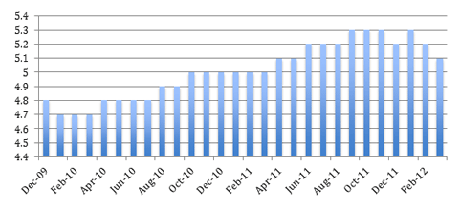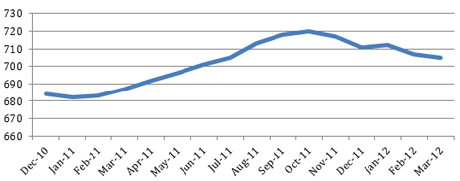The UK housing rental market could be about to crack
Despite high demand for housing and recent rises in rents, Britain's property rental market is showing signs of strain, says Phil Oakley. And that could be very bad news for house prices.
Get the latest financial news, insights and expert analysis from our award-winning MoneyWeek team, to help you understand what really matters when it comes to your finances.
You are now subscribed
Your newsletter sign-up was successful
Want to add more newsletters?

Twice daily
MoneyWeek
Get the latest financial news, insights and expert analysis from our award-winning MoneyWeek team, to help you understand what really matters when it comes to your finances.

Four times a week
Look After My Bills
Sign up to our free money-saving newsletter, filled with the latest news and expert advice to help you find the best tips and deals for managing your bills. Start saving today!
If you want to find out what's going on in the financial world it usually pays to look at the bond market. Bond investors tend to focus more on the facts, and be less emotional than equity investors.
A great example is Bill Gross, one of the world's best bond investors. In 1998 he wrote a great book, Bill Gross on Investing. It's full of good advice. But for me, the best part of the book is Gross's "plankton theory" and its application to the housing market.
"The plankton theory, like life itself, begins and ends in the ocean. Plankton, of course, are almost microscopic organisms that serve as food for higher life forms. Without plankton almost every fish and mammal in the sea could not survive, since most species depend upon other fish for their existence and plankton are the initial building blocks of the entire process."
MoneyWeek
Subscribe to MoneyWeek today and get your first six magazine issues absolutely FREE

Sign up to Money Morning
Don't miss the latest investment and personal finances news, market analysis, plus money-saving tips with our free twice-daily newsletter
Don't miss the latest investment and personal finances news, market analysis, plus money-saving tips with our free twice-daily newsletter
But what does this have to do with the housing market? Well, we're getting to that
"In the case of real estate, the plankton would be the first-time buyer (perhaps a young married couple) with a desire to own their own home but with very little capital to carry it off.
"When the time comes that they can't pull it off... then the plankton would disappear and the rapid escalation in housing prices would ease as well. For, unless the current homeowner has someone to sell his house to, he'll be unable to afford the house, and the process would continue into the echelons of Beverly Hills and Shaker Heights.
"In the end, the entire market would wither on the investment vine and home prices would stop increasing at the same rapid rate. So to gauge the health of the housing market, look first at the plankton."
There's a shortage of plankton in the UK housing market
So how are first-time buyers - the traditional plankton in the UK housing market - coping? The answer is not terribly well. Apart from a recent rush by some to beat a stamp duty holiday, first-time buyers have largely been priced out of the market.
To get decent mortgages, they need big deposits that are very difficult to save for with incomes under pressure. The government is trying to help with its New Buy scheme. This would allow first-time buyers to buy houses with 95% mortgages. However, many mortgage providers are setting rates for these schemes around 6% which is understandably putting many people off.
So if first-time buyers are no longer the plankton feeding the rest of the market, then who is? Look no further than the private rental market.
As with all markets, house prices are ultimately set by supply and demand. The 1990s UK house price crash saw high interest rates lead to a wave of repossessions.
This flooded the market with a supply of houses, pushing prices down. The banks are doing everything they can at the moment to stop this happening again. (Although see here for why we think this cannot last.)
Where does the private rental market feature in all this? Well, it is playing a part in both the demand and supply of houses. Frustrated would-be first-time buyers have been forced to rent, pushing monthly rental bills higher.
On the other side of the equation, more and more people are turning to property in search of higher investment returns than cash in the bank. This has led to a resurrection of the buy to let market.
On top of this, there has been a surge in reluctant landlords who either cannot or will not sell their homes and are choosing to rent them instead keeping them off the market. But just how healthy is the rental sector?
Why the private rental market could crack
Despite last year's rising rents and demand for housing, the rental market is showing signs of strain.
UK average rental yields

Source: LSL
Firstly, average rental yields of 5.1% don't look particularly appealing. Even the near-7% offered in markets like the North West of England are hardly stellar.
And this is not what typically ends up in your pocket. If you take into account letting management fees, voids and maintenance, then average actual net yields (before tax) would be at least 20% lower at 4% or 3.2% after tax. That doesn't seem worth it given the risks you have to take.
With house prices unlikely to rise (because of a lack of buyers, or plankton in Gross' terminology) renting out houses does not look like a good investment if you are looking at total returns. So investment demand could start to fall.
Of course, landlords who have owned rental properties for a long time will be getting much higher yields on their purchase cost, but are these yields going to rise from here?
UK average rents (£)

Source: LSL
According to lettings agency LSL, average UK rents are falling (London rents are down slightly too) and are now sitting at around the same level as last summer.
Why? Because while there may be lots of people wanting to rent properties, having the money to pay the rent is another matter.
A recent survey by the Association of Residential Letting Agents (ARLA) showed that 41.2% of its members saw a rising number of tenants struggling to meet their rental payments during the six months to March 2012. More tenants are haggling over their rents, too, with landlords finding it harder to push through rental increases.
And, according to Templeton LPA, the number of tenants in severe financial trouble rose by 10.2% in the first quarter of this year. Just over 9% of all rents were in arrears.
And if people aren't paying their rent, it becomes a lot harder for their landlords to pay the mortgage. Throw in the fact that many mortgage rates are going up, then we wouldn't be surprised if buy-to-let mortgage default rates started to increase.
If the private rental market begins to crack, we could see a double whammy of lower housing demand and higher supply as more rental properties are put on the market. This could be the straw that breaks the camel's back and triggers a long overdue correction in UK property prices.
Get the latest financial news, insights and expert analysis from our award-winning MoneyWeek team, to help you understand what really matters when it comes to your finances.
Phil spent 13 years as an investment analyst for both stockbroking and fund management companies.
-
 How a ‘great view’ from your home can boost its value by 35%
How a ‘great view’ from your home can boost its value by 35%A house that comes with a picturesque backdrop could add tens of thousands of pounds to its asking price – but how does each region compare?
-
 What is a care fees annuity and how much does it cost?
What is a care fees annuity and how much does it cost?How we will be cared for in our later years – and how much we are willing to pay for it – are conversations best had as early as possible. One option to cover the cost is a care fees annuity. We look at the pros and cons.